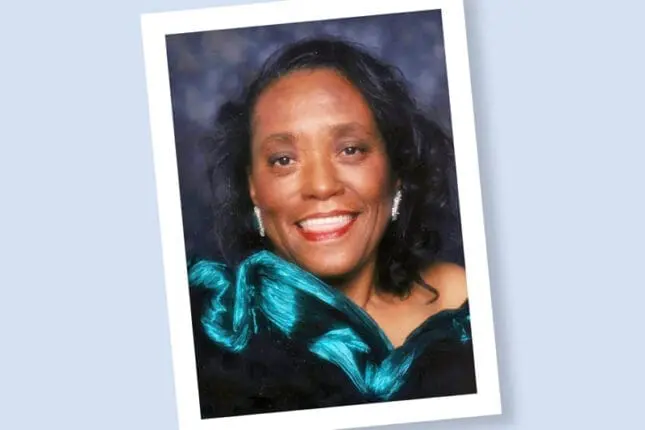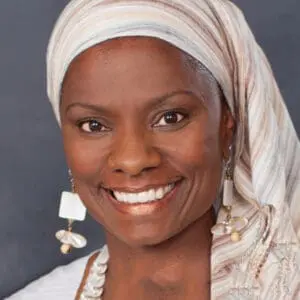I never had a traditional grandmother experience with Big Mama: she didn’t bake cookies, take me on trips, or share stories about the “good ole days.” Her arms were never able to hold me in a warm embrace, and her legs could never accompany me on walks around our neighborhood. As a child, I knew that my maternal grandmother, the queen of our family, had suffered a stroke that had changed her forever, but it took me a while to understand the reasons why and grasp the impact two white police officers had had on my grandmother’s heart and brain when they barged in through the door of her tenement apartment one snowy afternoon in February of 1960.
As was the case in most Harlem hubs of that time, my grandmother’s neighbors were her family. She knew every resident of the building where she, her siblings, and her children were raised. Despite being a poor, Black, single mother, she felt safe in her railroad flat. That’s why, when the police came for one of her brothers, whom they accused of having stolen a loaf of bread from a local bakery, she didn’t even have to unlock the door for them: her door hadn’t been locked in years.
“We’re looking for Albert,” one of the cops said. “Where is he?”
Over the years, each retelling of this story landed differently in my body. My child body responded with the fear that police could easily harm my own mother one day. And when I became someone’s mother, the story evoked rage, helplessness, and an understanding that showing my rage and helplessness in front of the police could result in violence my own children might witness.
Even now, I can picture my grandmother standing in her doorway, uncertain how to respond, as she held her youngest son in one arm, while clutching the hand of her five-year-old. “I don’t know,” she answered.
Their badges and white skin gave them the illusory privilege and false entitlement of lordship. Prying her five-year-old’s fingers from her and ignoring the screams of the baby, one of the policemen pressed the black barrel of his gun against my grandmother’s temple. Her stroke began in that spot, beside an arched eyebrow that had witnessed one injustice too many—every capillary in her body reacting to that act of aggression, by two people with undeserved authority and the power to fracture a family and end a life.
Gradually, the stroke began to commandeer the rest of her brain. She had time to straighten beds, make lunch for the boys, and prepare for the return of her four daughters from elementary school, but she was off balance and disoriented. She dropped pots and pans around her tiny kitchen, nearly breaking one of her toes. Later, when everyone was sitting around the table, she told her oldest brother, Sonny, a Korean War veteran, about her altercation with the police. By then, she was having trouble speaking. When her oldest daughter asked her if she was okay, my grandmother stared at her blankly.
And then she began to laugh. Her laughter was uncontrollable. She laughed and laughed.
Sonny put his arms around her and said, “Come on, we’re going to the hospital.”
He marched my grandmother out the door, carrying her down five flights of stairs to the stoop. It’s hard not to picture my grandmother’s six children—including the teenage girl who’d become my mother—sitting around the table in silence after having witnessed her unraveling. In that moment, uncertainty must have been their only reality.
My grandmother lapsed into a coma shortly after her admission to the hospital. Her situation appeared hopeless. The hospital priest was called in to perform the last rites. Four black dresses and two small suits were purchased on credit for each of her six children. The family prepared to bury their beloved queen.
But in keeping with Big Mama’s miraculous, life-giving spirit, she awakened on Good Friday morning. She never walked again, she never spoke more than three words—uh huh (for yes), no, and hey—and she required round-the-clock care for the remainder of her life. But despite her story of pain and loss, she remained a woman of tremendous spiritual stature, style, and grace. She lived the remainder of her days—an additional 51 years—inspiring others with her ability to shepherd big and small miracles into the lives of those around her. Her physical challenges didn’t change how much her children, and later her grandchildren, including me, adored her. At the age of 84, she died peacefully in her sleep.
Even though Big Mama couldn’t move her arms or legs, or take me to a park, or make me special breakfasts, or communicate with me as easily as many other grandmothers can with their granddaughters, she still conveyed her love and presence with the greatest healing balm she had—her infectious laugh.
Laughing was Big Mama’s favorite pastime. I used to call her the Black bodhisattva, sent to bring compassionate connection to strangers. While her stroke turned her arms and legs into appendages that no longer moved in rhythm with the world, her swift wit always caught jokes. Even on days when we didn’t know what the joke was (or whether it was on us), I was in awe of how her laughter could put all our worries into perspective. It brought us back to the present moment, nourished us, and reminded us of what we were grateful for. It was the sweetest sound—an acoustic version of honey-butter-dripped cornbread, only better. Every time her laughter rang out across the room, it delighted me, as if I was hearing it for the first time.
I became my grandmother’s primary caretaker for the last six years of her life. I know many people see caring for elderly relatives as a burden, but for me it was a privilege. During that time, our relationship deepened. We understood and respected each other. Through her example, I learned to look beyond the presenting problems of chronic illness, sorrow, oppression, poverty, and disability, and create a practice rooted in love, acceptance, and deep listening. On the evening of her death, I promised her that she’d never be forgotten.
My book, The Laugh of Love—a collection of “dialogues” I had with Big Mama in the seven years following her death—is part of that promise. I’d hoped I could move beyond my grief over losing her through journaling, but my journal entries grew into a series of dialogues with her spirit. Even after her death, her story—all she gave and overcame—still shines through in every dark crevice of my own life story. Her example of healing through love, hope, and forgiveness remains a valuable message for all of us striving to thrive on this planet.
Who’s Your Big Mama?
My Big Mama led me to find answers around unexpected questions. Despite the fact that she died penniless, she was my financial advisor. Although she never set foot on a college campus, she helped me achieve my educational goals and find joy and purpose in my work.
How can you find your Big Mama?
Grab an old journal—or even better, start a new one. In this process, remind yourself that you’re stepping into a river: as you continue to grow and change, this river will grow and change with you. Begin your new chapter by filling in a few of the following prompts:
- My living teachers are . . .
- My teachers on “the other side” are . . .
- I receive meaning in my life when I . . .
- I want to be remembered for . . .
As you write, notice what emerges. Does a person from your past show up? If so, what do you know about them already? What else would you like to know? Does a theme emerge that you’d like to explore?
When you find the Big Mama of your life, here are a few guidelines as you start your dialogue:
Be curious. Expand the vision that you have for yourself and others. Ask questions before making assumptions. See your life, your family, and your story through a wider lens than their trauma or their limitations. Explore the possibilities of growth and transformation that lie in their experiences.
Be open. While you may be seeking one answer as you begin this journey, you may discover a part of you or your healing process that surprises you.
Take a risk. Release yourself from the notions of right and wrong in this experience. Don’t be careful or mince words. Go for the hard stuff. There may be some sweet juice waiting for you if you can release judgement and let yourself feel.
Bring the laughter. Allow yourself the freedom to feel all emotions—sorrow, pain, grief, rage, confusion, gratitude, and joy. And throughout, see if you can find the laughter.
In my final journal entry, I asked Big Mama, “How hard should I laugh?” Her response: “Till you pee.” May you, in the discovery of your Big Mama, awaken that type of laughter in you.
Sabrina N'Diaye
Sabrina N’Diaye, PhD, LCSW-C, is an integrative psychotherapist, storyteller, and peacebuilder, based in Baltimore, MD. Her first book is Big Mama Speaks: Love Lessons from a Harlem River Swan.













